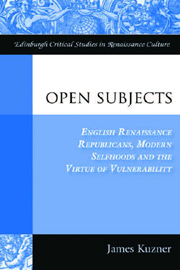Book contents
- Frontmatter
- Contents
- Acknowledgements
- Series Editor's Preface
- Introduction: Vulnerable Crests of Renaissance Selves
- 1 Legacies of Republicanism, Histories of the Self
- 2 ‘Without Respect of Utility’: Precarious Life and the Politics of Edmund Spenser's Legend of Friendship
- 3 Unbuilding the City: Coriolanus, Titus Andronicus and the Forms of Openness
- 4 ‘That Transubstantiall solacisme’: Andrew Marvell, Linguistic Vulnerability and the Space of the Subject
- 5 Habermas Goes to Hell: Pleasure, Public Reason and the Republicanism of Paradise Lost
- Epilogue: The Futures of Open Subjects
- Index
1 - Legacies of Republicanism, Histories of the Self
Published online by Cambridge University Press: 12 September 2012
- Frontmatter
- Contents
- Acknowledgements
- Series Editor's Preface
- Introduction: Vulnerable Crests of Renaissance Selves
- 1 Legacies of Republicanism, Histories of the Self
- 2 ‘Without Respect of Utility’: Precarious Life and the Politics of Edmund Spenser's Legend of Friendship
- 3 Unbuilding the City: Coriolanus, Titus Andronicus and the Forms of Openness
- 4 ‘That Transubstantiall solacisme’: Andrew Marvell, Linguistic Vulnerability and the Space of the Subject
- 5 Habermas Goes to Hell: Pleasure, Public Reason and the Republicanism of Paradise Lost
- Epilogue: The Futures of Open Subjects
- Index
Summary
This chapter gives the background against which the ideas of Open Subjects come into focus. I look at how we presently view two connected topics: the legacy of early modern republicanism and the history of modern selfhood. The view established, I then explore how we might begin to re-orient our perspectives, and describe the forms of life that appear when we do so.
Open Subjects and the English Republican Legacy
I have said that one critical tradition to which Open Subjects offers an alternative could be called ‘republican’. I have also said that the alternative that I present is itself republican. The question of Spenser, Shakespeare, Marvell and Milton's republicanism – its facets as well as its legacy – arises time and again in this book, and I want to be up front in explaining this ostensible paradox. Many dimensions of republican thought emerge over the course of my analysis, but I can also put my point about such thought fairly simply: whereas republican figures are usually understood to regard vulnerability as that which community ought to minimise, I show how these figures also embrace vulnerability as that which community has to offer.
The question of what qualifies as ‘republican’ is a difficult one. Of republicanism, John Adams writes that ‘[t]here is not a more unintelligible word in the English language.’
- Type
- Chapter
- Information
- Open SubjectsEnglish Renaissance Republicans Modern Selfhoods and the Virtue of Vulnerability, pp. 10 - 38Publisher: Edinburgh University PressPrint publication year: 2011



